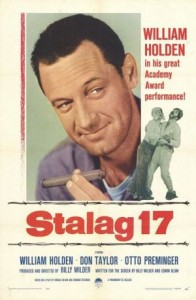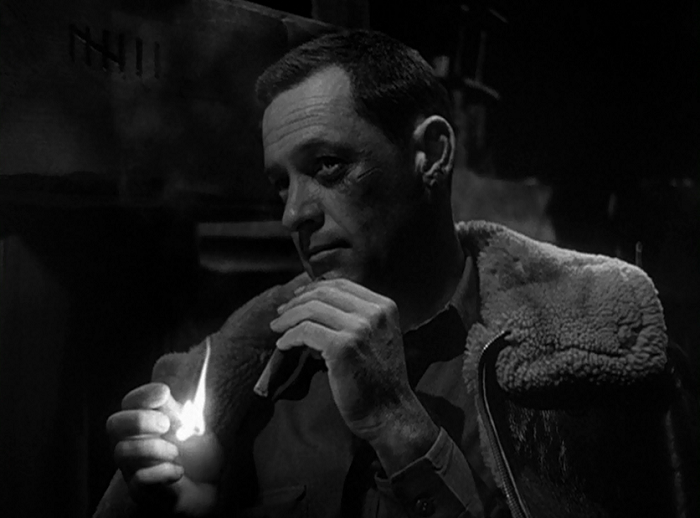“There are two people in this barracks who know I didn’t do it: me and the guy that did do it.”
|

Synopsis:
After two men attempting escape die in a German prisoner-of-war camp, a cynical wheeler-dealer (William Holden) is falsely accused of being an informant to the barrack’s Kommandant (Otto Preminger). Someone is sending secret messages to their presiding guard (Sig Rumann) — but who could it be?
|
|
Genres, Themes, Actors, and Directors:
- Billy Wilder Films
- Falsely Accused
- Neville Brand Films
- Otto Preminger Films
- Mistaken or Hidden Identities
- Play Adaptation
- Prisoners of War
- Spies
- William Holden Films
- World War Two
Response to Peary’s Review:
Peary writes that this wartime spy flick — directed by Billy Wilder, and based on a Broadway play by Donald Bevan and Edmund Trzcinski — “stumbles along at the beginning, as we try to adjust to the rowdy comedy that plays a major part in the film” (he asserts that “these men need laughter in their lives”), but argues that “it really gets exciting once we viewers are let in on the spy’s identity”, at which point we “can’t wait till Holden traps the culprit”. I essentially agree with Peary’s assessment, though I feel more strongly that the “rowdy comedy” detracts from an otherwise powerful drama — I’ve learned that the presence of character actor Harvey Lembeck automatically makes me think of awful Beach Party flicks and brings to mind terms like “annoying” and “obnoxious”. Regardless, Holden’s performance is excellent, and the spy storyline is quite compelling: despite guessing the spy’s identity fairly early on, this didn’t detract from my enjoyment, instead allowing for a creepy “close-read” of a man so easily able to fool so many people under such high stakes. The moral of the story is: beware of false accusations and crowd mentality.
Redeeming Qualities and Moments:
- William Holden as Sefton

- Creative direction
Must See?
Yes, once, for Holden’s Oscar-winning performance.
Categories
Links:
|


One thought on “Stalag 17 (1953)”
A once-must, at least (though it will hold up well on a repeat viewing) – for its place in cinema (and WWII) history.
I’ve seen this film a number of times over the years. It’s solid. I don’t think the comedy detracts from the drama. Though I can see where some might think that. If Wilder was trying to balance the grim, depressing atmosphere of the camp with something to lighten things up a little, he may have gone a bit overboard (and that may have been a hard thing to balance appropriately, anyway – since there are prominent characters with senses of humor that they can’t just turn on and off).
At any rate, I don’t think the film “stumbles along” in the beginning. I think things are pretty much carried off well from the start.
That said, I do find that I prefer the second half of the film more. Once the specifics of the plot start to sharpen, I think the film really takes off and is a rather compelling watch.
Fave scene: A drunk Robert Strauss mistakes Lembeck for his dream girl – Betty Grable – and dances with him flirtatiously. I rather enjoy Strauss and Lembeck both in this and, of course, the general scenes of men dancing together are fun from a gay point of view.
The DVD has some interesting and informative extras on it – specifically one about the making of the film, starting with an overview of when the source material was a Broadway play. Perhaps somewhat against the odds, both the play and the film were huge hits (although in turning the play into a film, Wilder had the story rewritten almost completely, apparently).